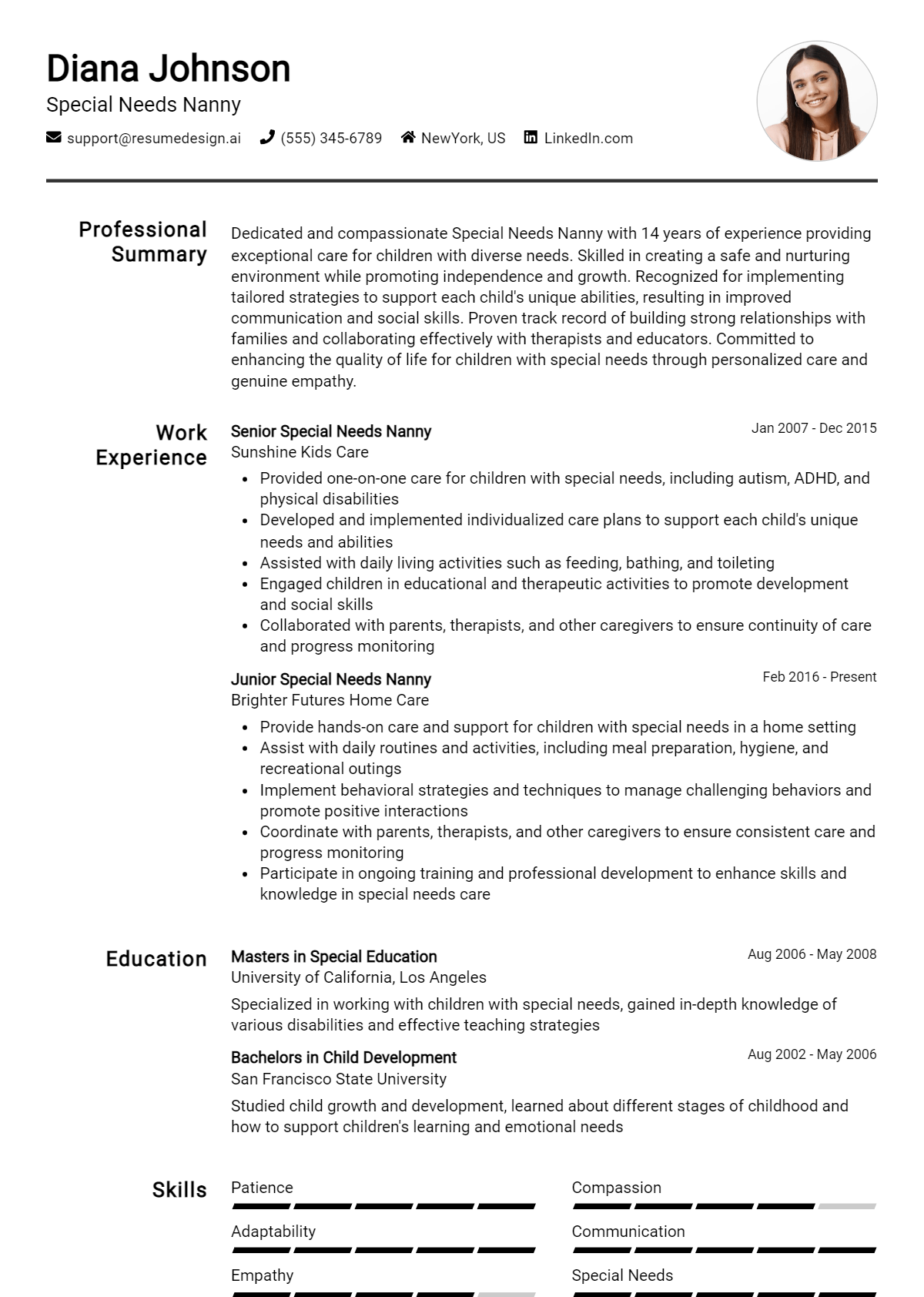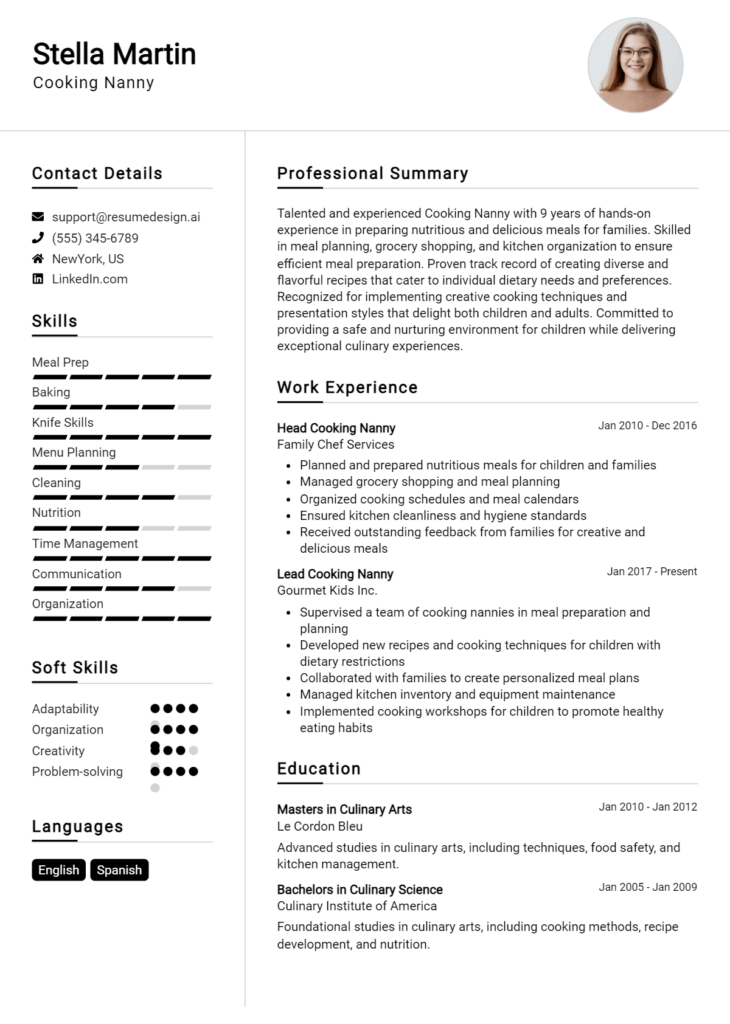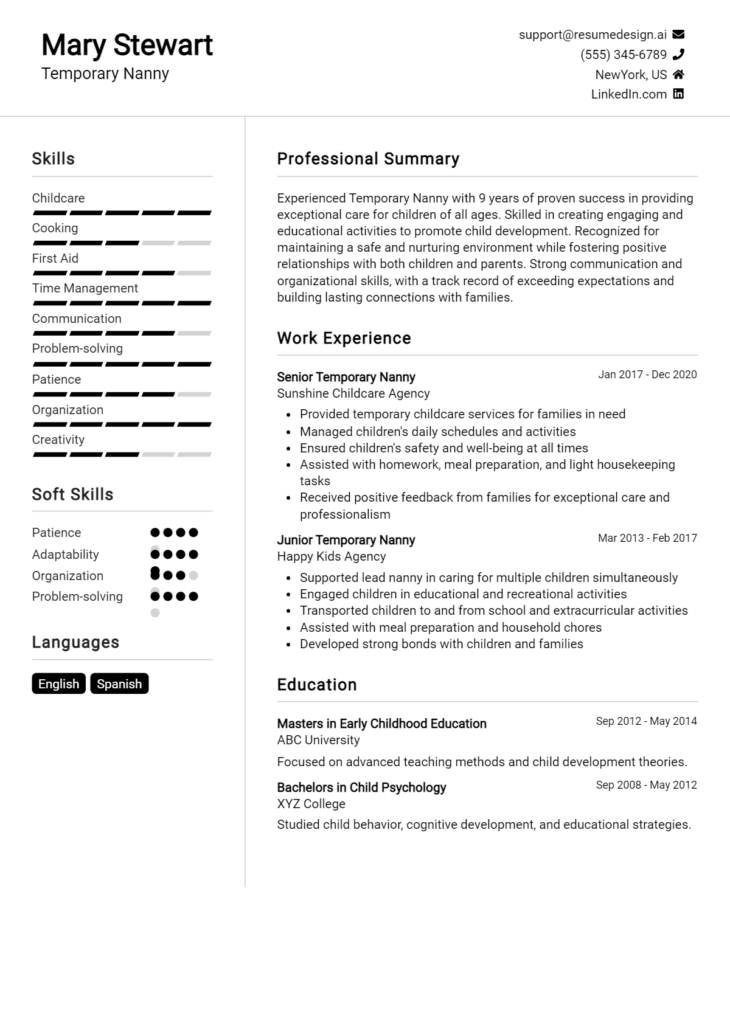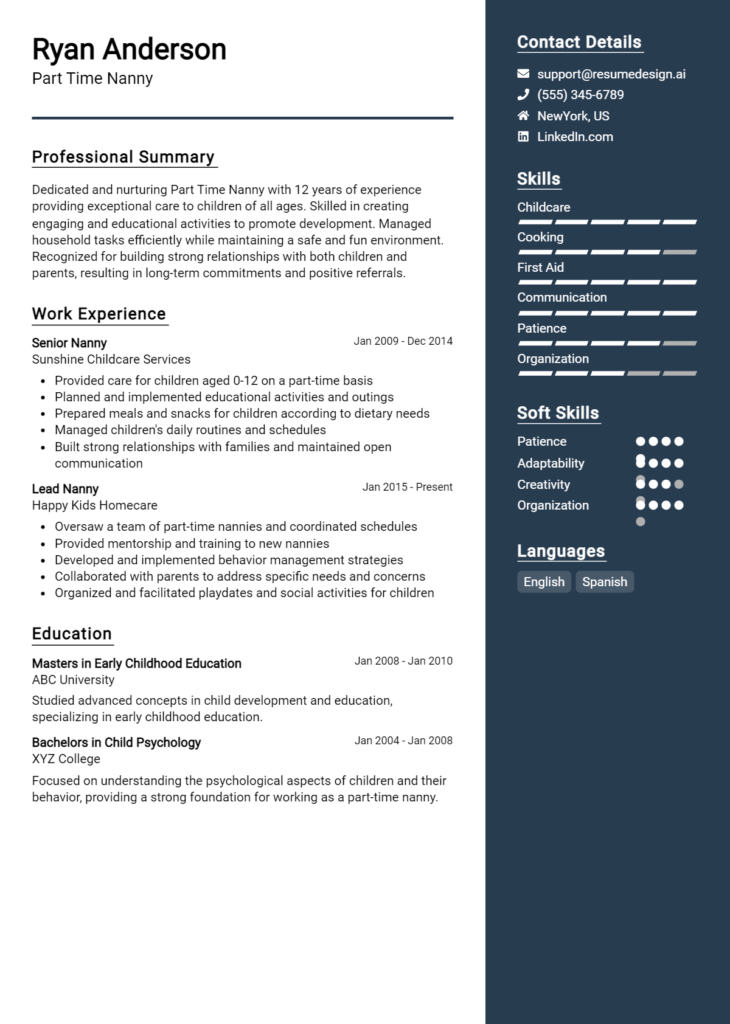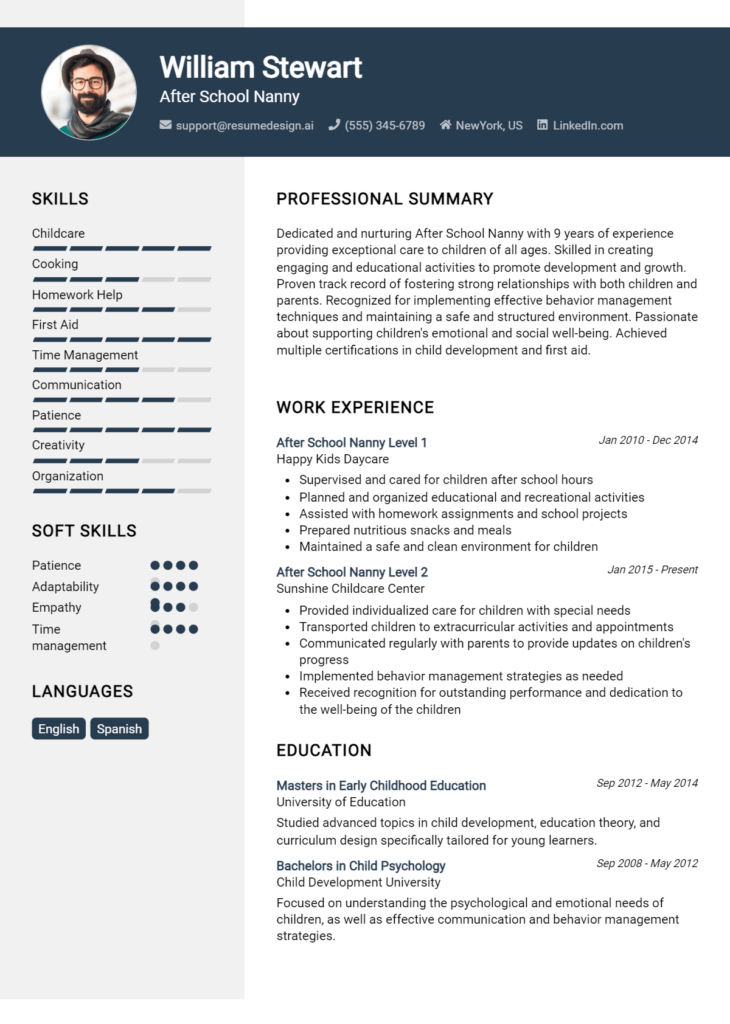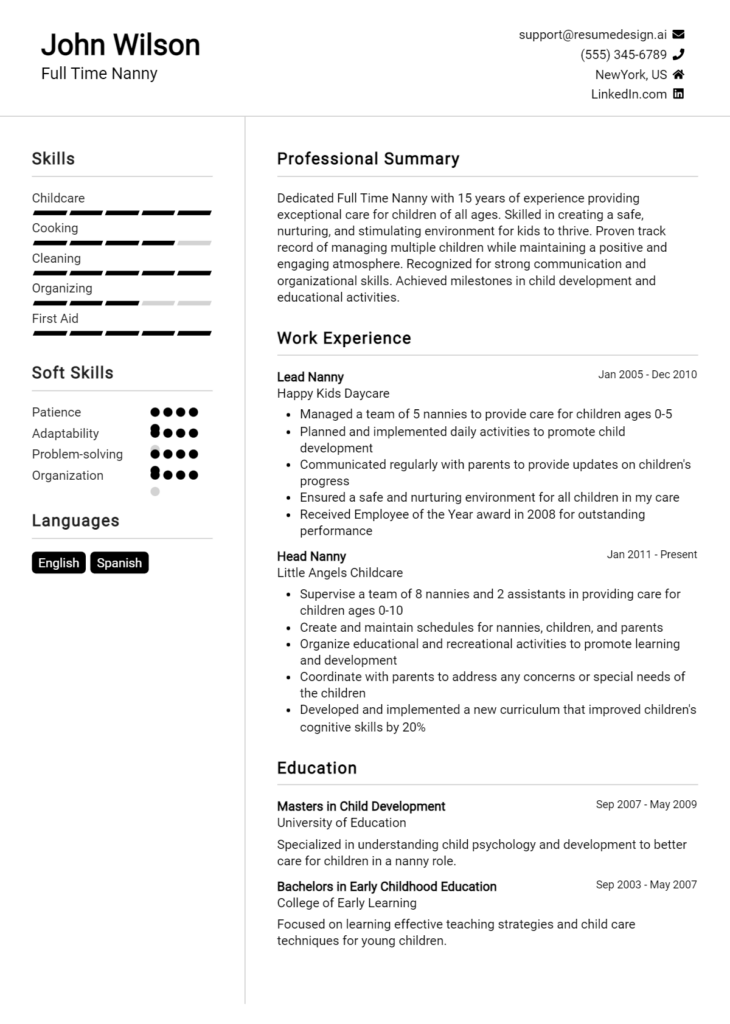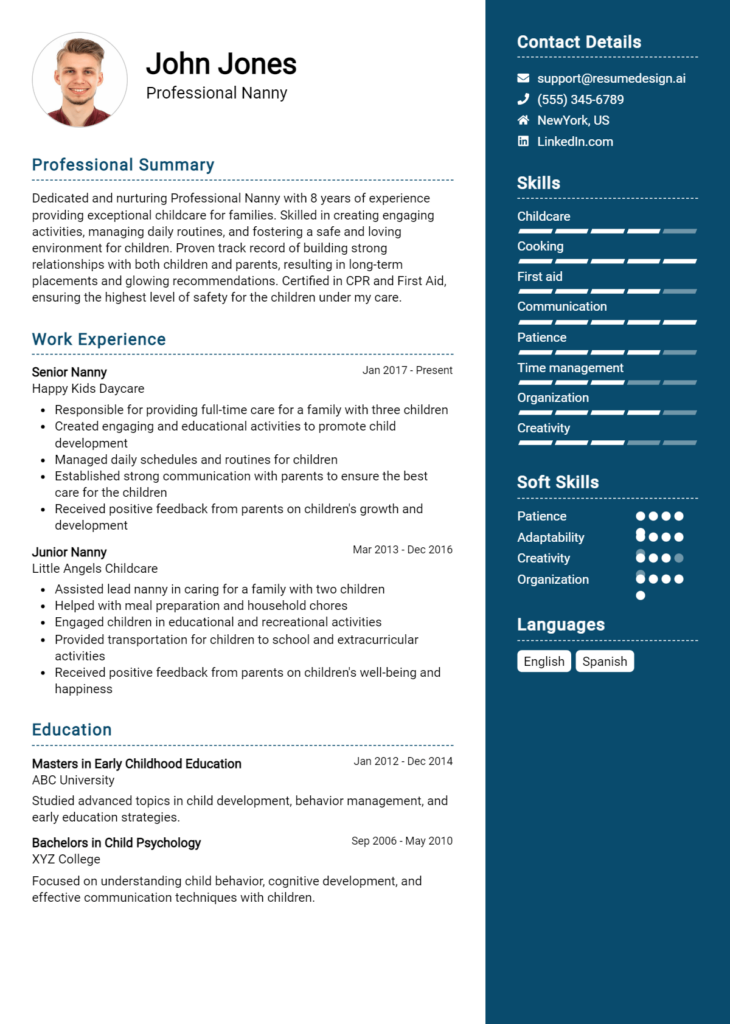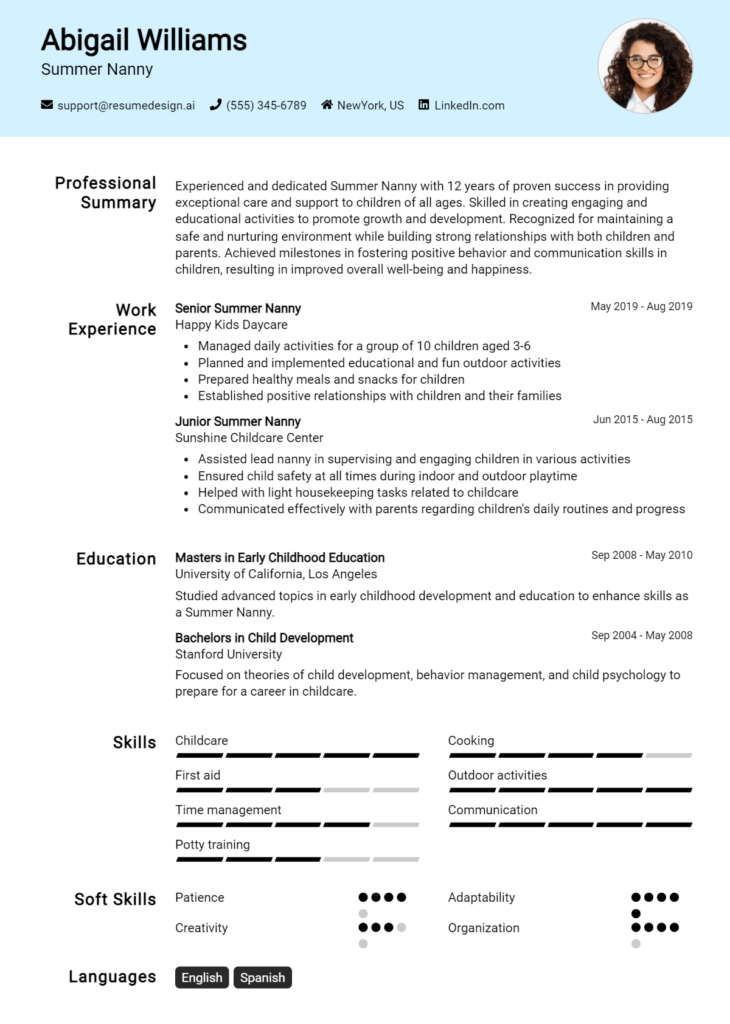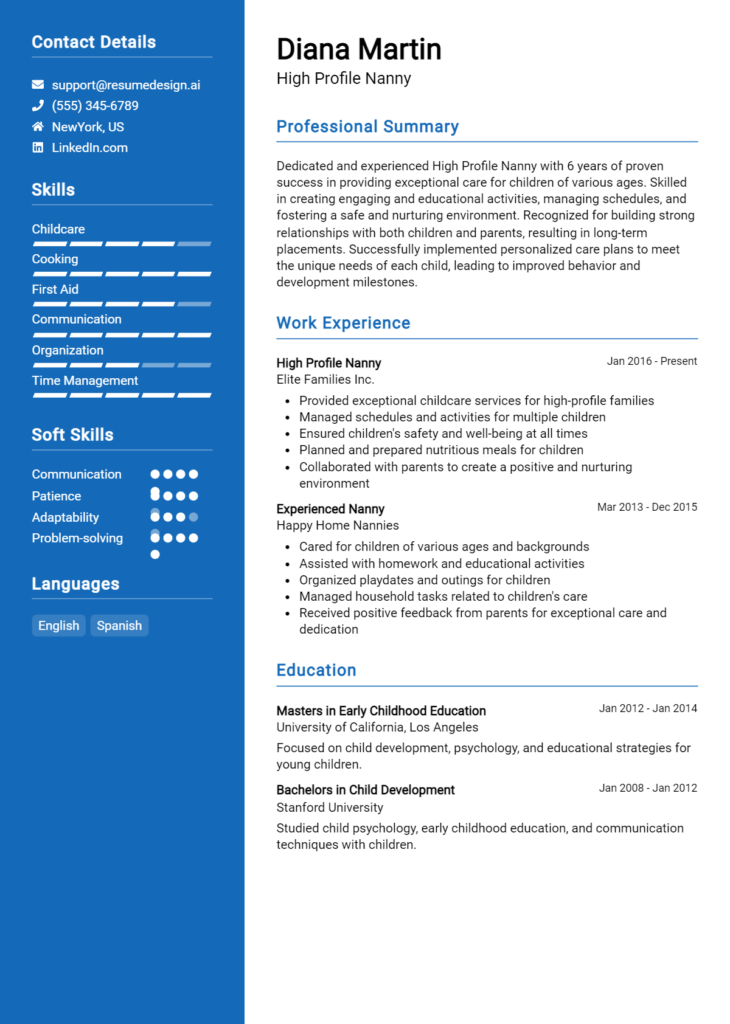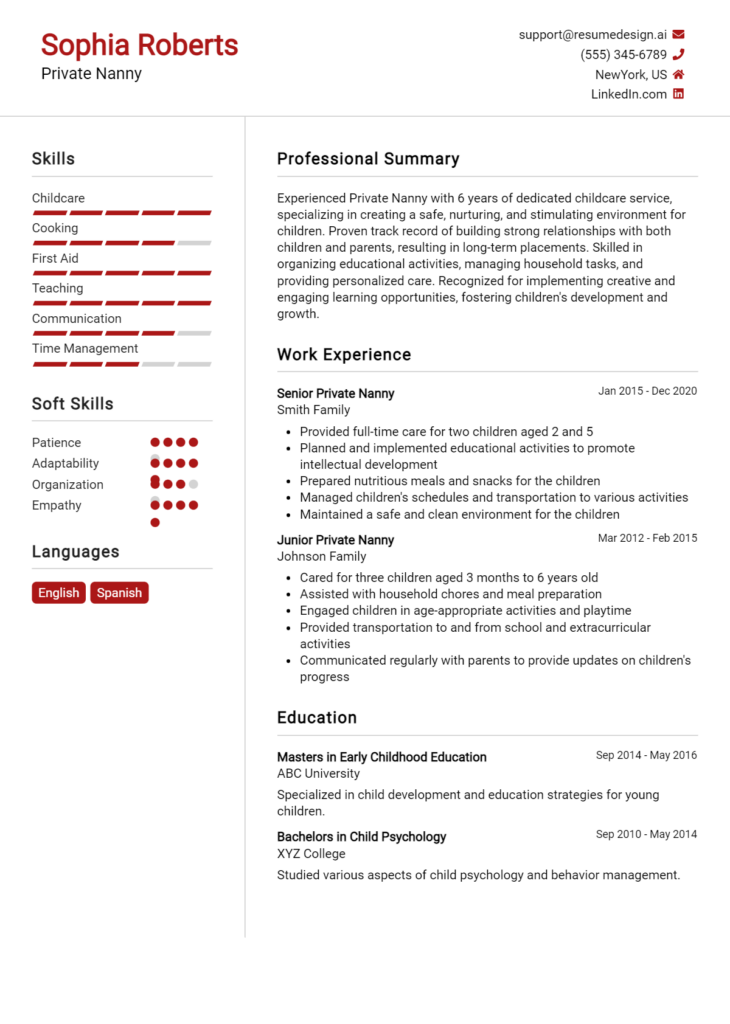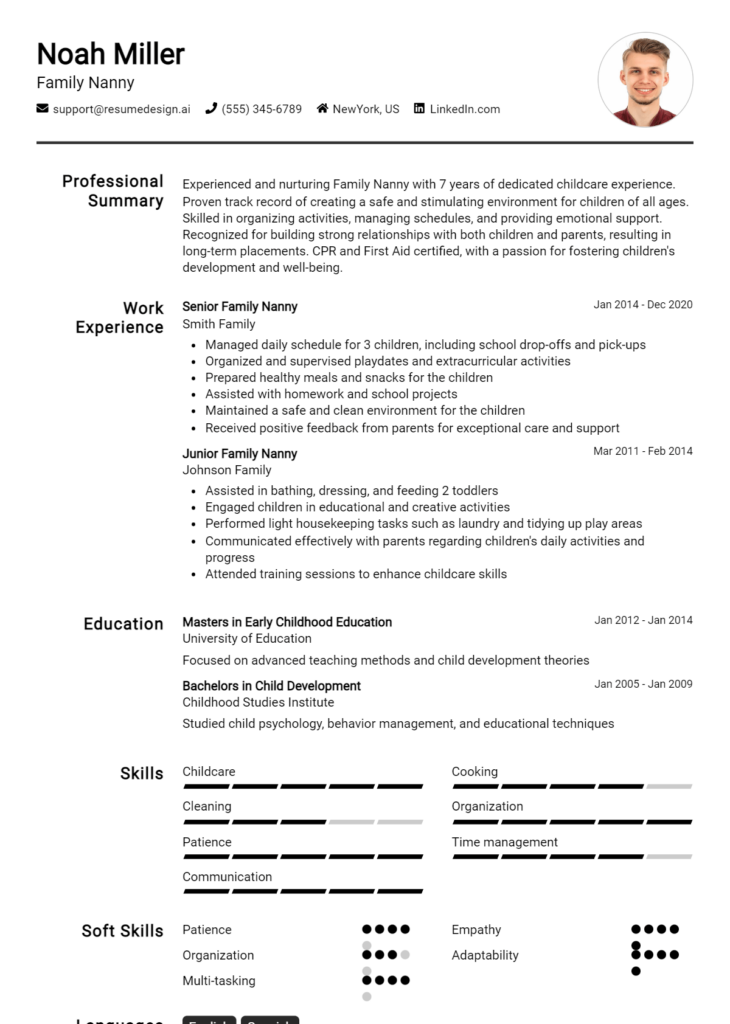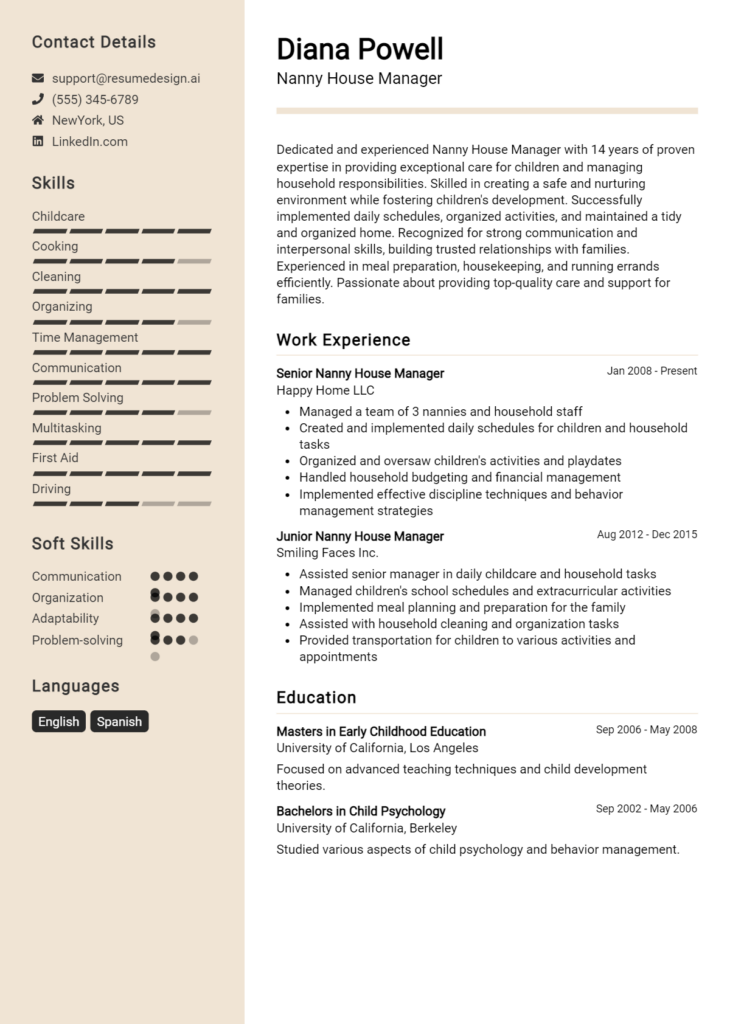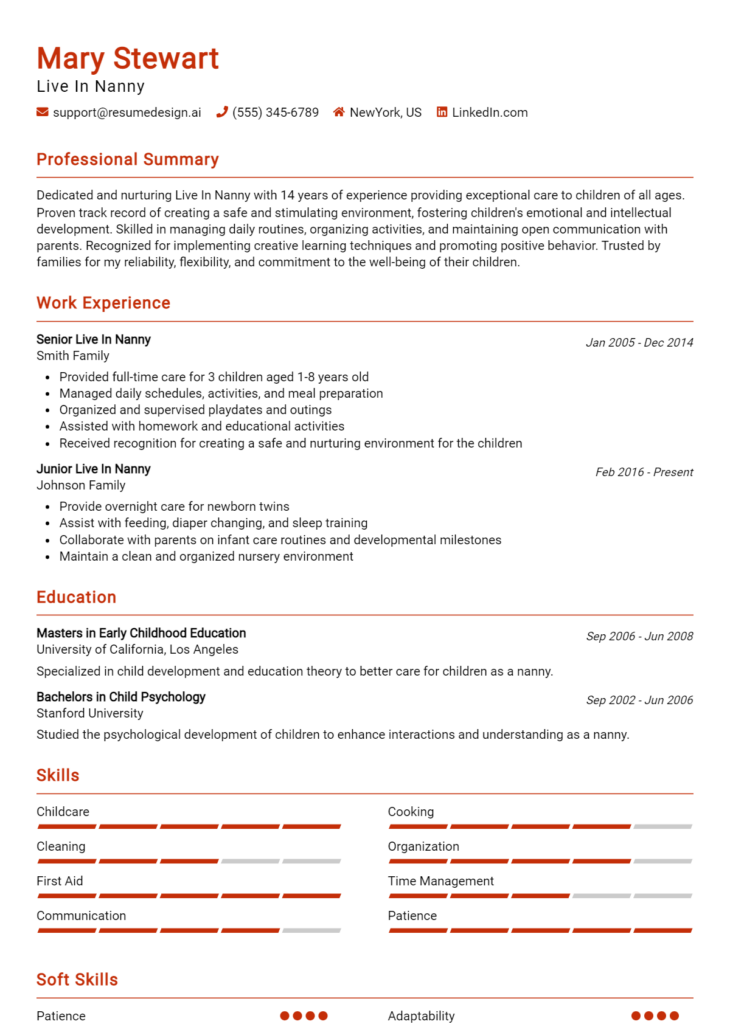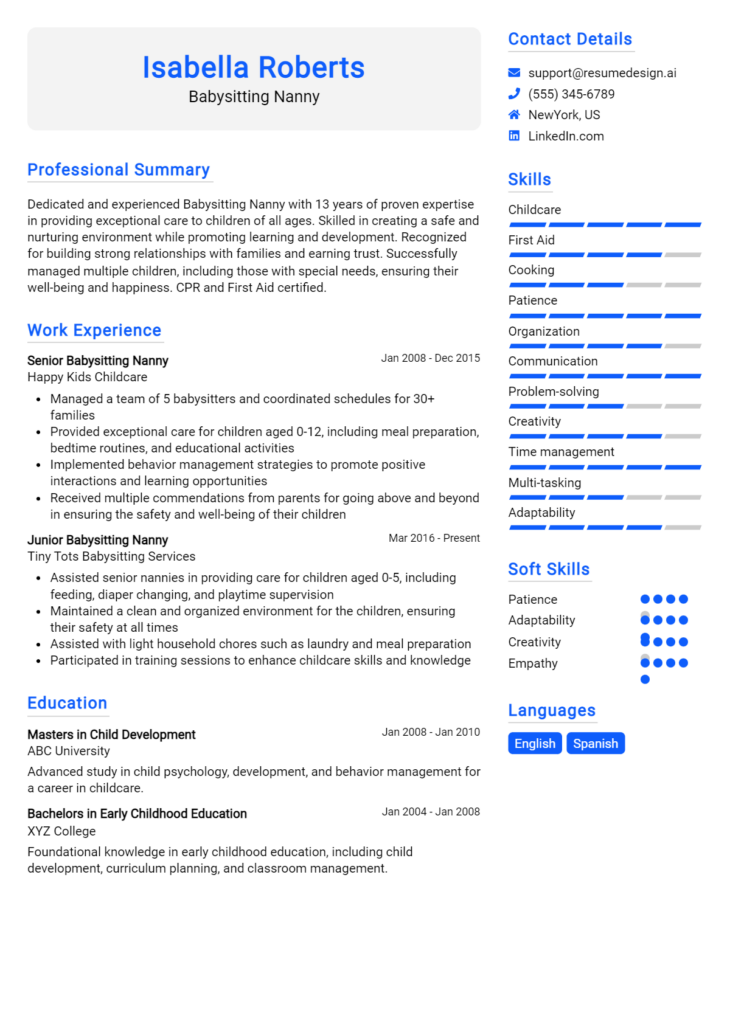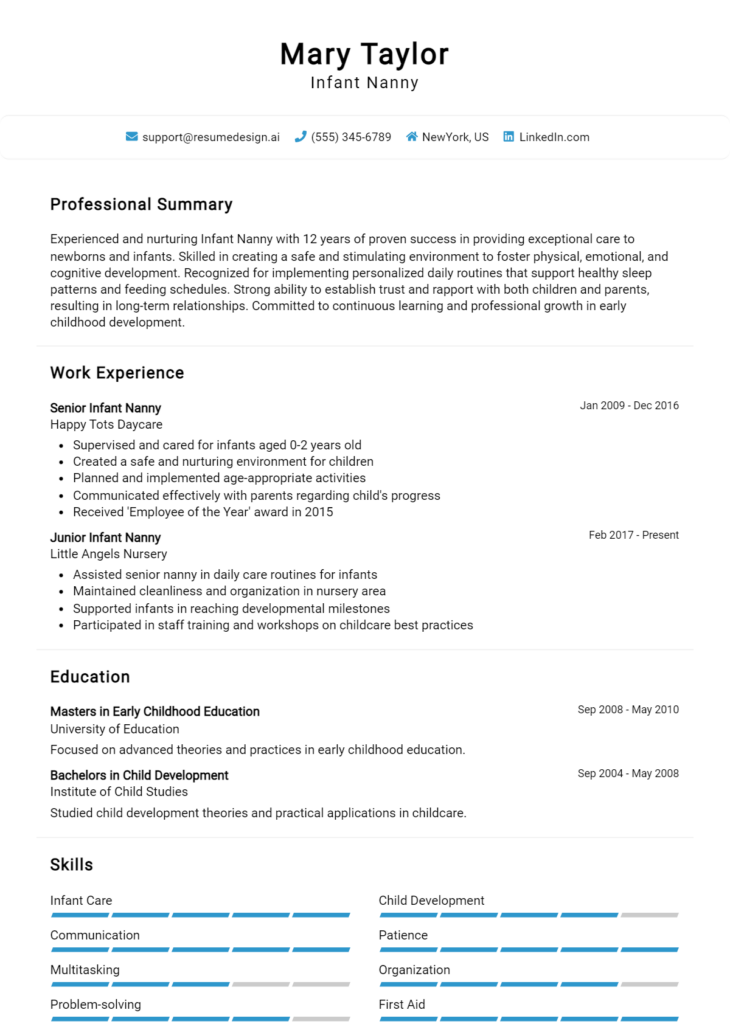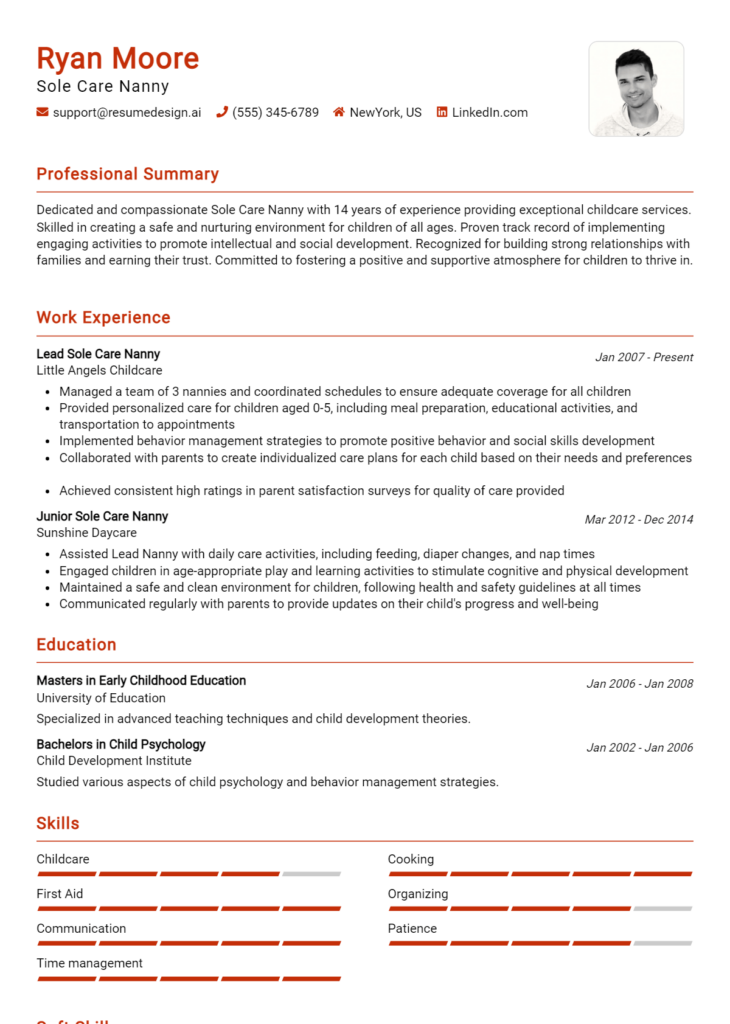Special Needs Nanny Core Responsibilities
A Special Needs Nanny plays a crucial role in supporting children with diverse needs, requiring a blend of technical, operational, and problem-solving skills. Responsibilities include implementing individualized care plans, coordinating with healthcare professionals, and fostering a nurturing environment. This role bridges the gap between family, educational, and medical departments, ensuring consistent communication and holistic support. A well-structured resume that highlights these competencies is essential for demonstrating the value of a Special Needs Nanny in achieving organizational goals.
Common Responsibilities Listed on Special Needs Nanny Resume
- Develop and implement individualized care plans
- Assist with daily living activities and personal care
- Monitor and document behavioral and developmental progress
- Coordinate with therapists, teachers, and healthcare providers
- Prepare and administer medication as prescribed
- Engage in educational and therapeutic activities
- Provide emotional support and companionship
- Maintain a safe and stimulating environment
- Communicate effectively with parents and guardians
- Manage challenging behaviors with positive reinforcement
- Plan and supervise recreational activities
- Maintain confidentiality and professionalism at all times
High-Level Resume Tips for Special Needs Nanny Professionals
Crafting a well-structured resume is crucial for Special Needs Nanny professionals, as it serves as the first impression to potential employers. In a field where compassion, expertise, and a tailored approach are paramount, it is essential that your resume highlights not only your skills but also your achievements in supporting children with diverse needs. A strong resume can effectively communicate your dedication, experience, and understanding of the unique requirements of special needs care. This guide will provide practical and actionable resume tips specifically tailored for Special Needs Nanny professionals, ensuring you stand out in a competitive job market.
Top Resume Tips for Special Needs Nanny Professionals
- Tailor your resume to each job description by incorporating relevant keywords and phrases that match the specific role.
- Highlight your experience with special needs children, detailing the types of disabilities you have worked with and the strategies you employed.
- Quantify your achievements where possible; for example, mention improvements in a child's behavior, academic performance, or social skills.
- Showcase industry-specific skills such as CPR/First Aid certification, behavior management techniques, and communication methods.
- Include any relevant training or coursework in special education, child development, or related fields to demonstrate your expertise.
- Emphasize your soft skills, such as patience, empathy, and adaptability, which are essential in a caregiving role.
- Utilize a clean, professional format that makes it easy for employers to quickly scan your resume for key information.
- Incorporate testimonials or references from previous employers or families you’ve worked with to provide credibility and build trust.
- Keep your resume concise, ideally one page, while ensuring all critical information is included and presented clearly.
By implementing these tips, you can significantly enhance your chances of landing a job in the Special Needs Nanny field. A well-crafted resume will not only showcase your qualifications and experiences but also reflect your passion for making a positive impact in the lives of children with special needs. Stand out from the competition and take the first step toward your ideal role with a resume that truly represents your capabilities and dedication.
Why Resume Headlines & Titles are Important for Special Needs Nanny
In the competitive job market for Special Needs Nanny positions, crafting a compelling resume headline or title is crucial. A well-crafted headline serves as the first impression a hiring manager has of a candidate, succinctly summarizing their key qualifications and unique strengths in just a few words. It should be both concise and relevant, directly reflecting the skills and experiences pertinent to the role. An impactful headline not only grabs attention but also sets the tone for the rest of the resume, indicating to employers that the candidate possesses the necessary expertise and dedication to excel in caring for children with special needs.
Best Practices for Crafting Resume Headlines for Special Needs Nanny
- Keep it concise: Aim for a headline that is no more than 10-12 words.
- Be specific: Use terminology that directly relates to the Special Needs Nanny role.
- Highlight key strengths: Focus on your most relevant skills and experiences.
- Use action words: Start with strong verbs that convey your expertise and capabilities.
- Include certifications: Mention any relevant certifications, such as CPR or specific special education training.
- Tailor it to the job: Customize the headline based on the specific job description and requirements.
- Avoid jargon: Use clear and straightforward language that all hiring managers can understand.
- Emphasize results: If applicable, highlight any notable achievements or positive outcomes in previous roles.
Example Resume Headlines for Special Needs Nanny
Strong Resume Headlines
Compassionate Special Needs Nanny with 5+ Years of Experience in Autism Care
Dedicated Caregiver Specializing in Developmental Support for Children
Certified Special Needs Nanny Focused on Individualized Learning Plans
Experienced Nanny Skilled in Behavioral Management and Therapeutic Techniques
Weak Resume Headlines
Nanny Looking for a Job
Childcare Professional
Special Needs Experience
The strong resume headlines are effective because they are specific, highlight relevant skills, and immediately communicate the candidate's experience and dedication to the field of special needs care. They provide clear insights into what the candidate brings to the table, making them memorable. In contrast, the weak headlines fail to impress due to their vagueness and lack of focus. They do not convey any unique qualities or strengths, leaving hiring managers with little reason to consider the candidate further. A strong headline can make all the difference in capturing attention and piquing interest in a competitive job market.
Writing an Exceptional Special Needs Nanny Resume Summary
A well-crafted resume summary is crucial for a Special Needs Nanny as it serves as the first impression for hiring managers. This concise section of your resume quickly captures attention by showcasing your key skills, relevant experience, and notable accomplishments that highlight your qualifications for the role. A strong summary should be impactful and tailored specifically to the job you are applying for, allowing potential employers to immediately see how you align with their needs and expectations.
Best Practices for Writing a Special Needs Nanny Resume Summary
- Quantify Achievements: Use numbers and specific examples to demonstrate your impact and effectiveness.
- Focus on Relevant Skills: Highlight skills that are directly applicable to caring for children with special needs, such as communication, patience, and adaptability.
- Tailor for the Job Description: Customize your summary to reflect the specific requirements and duties outlined in the job posting.
- Showcase Experience: Include years of experience and types of special needs you have worked with to establish credibility.
- Highlight Certifications: Mention any relevant certifications or training that enhance your qualifications for the role.
- Utilize Action Words: Start with strong action verbs to convey a sense of proactivity and competence.
- Keep It Concise: Aim for 2-4 sentences that are clear and direct, avoiding unnecessary jargon.
- Emphasize Empathy: Convey your passion for working with children and your commitment to their well-being.
Example Special Needs Nanny Resume Summaries
Strong Resume Summaries
Dedicated Special Needs Nanny with over 5 years of experience providing compassionate care for children with autism and ADHD. Successfully implemented individualized learning plans that improved social interaction skills by 30% within six months.
Certified Special Needs Caregiver skilled in developing engaging activities that promote cognitive and emotional growth. Fostered a safe and nurturing environment for children with developmental disabilities, resulting in a 95% satisfaction rate from parents.
Experienced Special Needs Nanny with a proven track record of supporting children with physical disabilities. Enhanced mobility and independence through tailored exercise routines, leading to a 40% improvement in physical activity levels.
Weak Resume Summaries
I am a nanny who has worked with kids for a while. I enjoy helping children and have some experience with special needs.
Nanny with experience in various child care settings. I have worked with children of all types and am passionate about their development.
The strong resume summaries are considered effective because they include specific details about the candidate's experience, showcase quantifiable achievements, and directly relate to the requirements of a Special Needs Nanny position. In contrast, the weak summaries lack specificity, fail to convey measurable outcomes, and appear too generic, which diminishes their impact and effectiveness in attracting the attention of hiring managers.
Work Experience Section for Special Needs Nanny Resume
The work experience section of a Special Needs Nanny resume is critical in demonstrating the candidate's practical abilities and effectiveness in supporting individuals with diverse needs. This section not only highlights technical skills, such as specialized care techniques and personalized educational support, but also illustrates the candidate's capability to manage teams and collaborate with other caregivers and professionals. By quantifying achievements and aligning experiences with industry standards, candidates can effectively showcase their contributions and readiness for the role, ensuring they stand out in a competitive job market.
Best Practices for Special Needs Nanny Work Experience
- Highlight relevant certifications and training specific to special needs care.
- Use quantifiable results to demonstrate the impact of your work, such as improved behavioral outcomes or skill development.
- Detail your experience with individualized care plans and how you tailored approaches to meet specific needs.
- Emphasize collaboration with families, therapists, and educators to provide comprehensive support.
- Showcase your ability to manage and lead a team if applicable, including any mentoring or training roles.
- Document any emergency or crisis management experiences, highlighting your quick thinking and problem-solving skills.
- Include testimonials or positive feedback from families or professionals you have worked with.
- Align your experiences with industry standards, using terminology and metrics common in special needs care.
Example Work Experiences for Special Needs Nanny
Strong Experiences
- Provided one-on-one support for a child with autism, leading to a 30% improvement in social interaction skills over six months.
- Collaborated with a multidisciplinary team to develop and implement individualized care plans, resulting in a 25% reduction in behavioral incidents.
- Trained and supervised a team of three junior caregivers, fostering a supportive environment that improved overall client satisfaction ratings by 40%.
- Designed and executed tailored educational activities that enhanced cognitive skills, contributing to a 15% increase in academic performance.
Weak Experiences
- Helped children with special needs without specifying the type of support provided.
- Worked as a nanny for a family, but did not clarify the nature of the special needs involved.
- Assisted with daily living tasks, but failed to highlight any measurable impact or outcomes.
- Gained experience in childcare, but did not mention specific skills or techniques used for special needs care.
The examples labeled as strong are effective because they provide concrete metrics and specific scenarios that illustrate the candidate's contributions and effectiveness in their role. They demonstrate a clear understanding of the needs of special needs individuals and how the candidate addressed those needs through collaboration and customized care. In contrast, the weak experiences lack detail and clarity, failing to convey the candidate's true impact or expertise in the field. They do not provide measurable outcomes or specific skills, making it difficult for potential employers to assess the candidate's qualifications.
Education and Certifications Section for Special Needs Nanny Resume
The education and certifications section of a Special Needs Nanny resume plays a crucial role in showcasing the candidate's academic credentials, specialized training, and commitment to continuous professional development. This section highlights the candidate's relevant coursework and certifications, which can significantly enhance their credibility and demonstrate their alignment with the specific requirements of the job role. By providing evidence of their educational background and industry-relevant qualifications, candidates can effectively illustrate their preparedness to meet the unique needs of children with special requirements.
Best Practices for Special Needs Nanny Education and Certifications
- Include only relevant educational qualifications that pertain to child care, special education, or related fields.
- List certifications that are recognized within the industry, such as CPR, First Aid, or specialized special needs training.
- Detail any relevant coursework that directly applies to working with children with special needs.
- Highlight any advanced degrees or credentials that demonstrate a higher level of expertise.
- Provide dates of completion to showcase recent and relevant education.
- Include any workshops, seminars, or conferences attended that relate to special needs care.
- Consider adding a section for ongoing education to show commitment to professional growth.
- Use clear and concise language to ensure easy readability and understanding of qualifications.
Example Education and Certifications for Special Needs Nanny
Strong Examples
- Bachelor's Degree in Special Education, XYZ University, 2021
- Certified Child Care Professional (CCP), National Association for the Education of Young Children, 2022
- Advanced Behavior Analysis Certificate, ABC Institute, 2023
- CPR and First Aid Certification, American Red Cross, 2023
Weak Examples
- High School Diploma, 2010
- Certificate in Generic Child Care, Unaccredited Online Course, 2019
- Basic Cooking Course, Community College, 2020
- Old CPR Certification (Expired), American Heart Association, 2018
The strong examples listed are considered effective because they directly relate to the skills and knowledge required for a Special Needs Nanny, showcasing relevant degrees and recognized certifications. In contrast, the weak examples are deemed ineffective due to their lack of relevance to special needs care, outdated status, or lack of accreditation, which diminishes the candidate's credibility in the role.
Top Skills & Keywords for Special Needs Nanny Resume
When crafting a resume for a Special Needs Nanny position, highlighting the right skills is crucial to demonstrate your ability to cater to the unique needs of children with disabilities. A well-rounded skill set not only showcases your professional capabilities but also reflects your adaptability, patience, and empathy—qualities that are indispensable in providing attentive care. By emphasizing both hard and soft skills, you can create a compelling narrative that appeals to potential employers. This targeted approach can significantly enhance your chances of standing out in a competitive job market.
Top Hard & Soft Skills for Special Needs Nanny
Soft Skills
- Empathy
- Patience
- Communication
- Adaptability
- Problem-solving
- Active listening
- Emotional intelligence
- Time management
- Creativity
- Teamwork
Hard Skills
- CPR and First Aid Certification
- Knowledge of developmental disorders
- Behavior management techniques
- Special education training
- Medication administration
- Assistive technology proficiency
- Child safety protocols
- Activity planning and organization
- Basic sign language skills
- Nutrition and dietary management
To further enhance your resume, consider exploring more about skills and work experience that can effectively showcase your qualifications for the role.
Stand Out with a Winning Special Needs Nanny Cover Letter
Dear [Hiring Manager's Name],
I am writing to express my enthusiasm for the Special Needs Nanny position advertised at [Company/Family Name]. With a background in child development and hands-on experience working with children with diverse needs, I am confident in my ability to provide a nurturing and supportive environment that fosters growth and learning. My commitment to understanding each child's unique requirements, along with my patience and empathy, positions me as a strong candidate for this role.
In my previous role as a nanny for a child with autism, I developed and implemented individualized activity plans tailored to the child's interests and developmental goals. Utilizing visual aids and engaging activities, I was able to enhance communication skills and social interactions. My background in [specific relevant training or certifications, e.g., CPR, first aid, special education] has equipped me with the tools to handle various situations with care and confidence. I pride myself on maintaining open and honest communication with parents, ensuring that we work together as a team to support the child's needs.
I believe that every child deserves the opportunity to thrive, and I am passionate about creating an inclusive atmosphere where they feel safe and valued. My ability to adapt to changing circumstances and remain calm under pressure has proven invaluable in my previous experiences. I am eager to bring my skills and dedication to [Company/Family Name], contributing positively to your child's development and well-being.
Thank you for considering my application. I look forward to the opportunity to discuss how my experience and approach can benefit your family. I am excited about the possibility of partnering with you to provide the best care for your child and help them achieve their fullest potential.
Sincerely,
[Your Name]
[Your Contact Information]
Common Mistakes to Avoid in a Special Needs Nanny Resume
When applying for a position as a Special Needs Nanny, crafting an effective resume is crucial to stand out in a competitive job market. However, there are common pitfalls that candidates often encounter, which can undermine their chances of securing an interview. Avoiding these mistakes can help you present your qualifications and experiences more effectively, highlighting your suitability for this specialized role. Here are some common mistakes to watch out for when creating your resume:
Failing to Tailor the Resume: Not customizing your resume for each job application can make you appear uninterested. Take the time to align your skills and experiences with the specific requirements of the position.
Neglecting Relevant Experience: Omitting vital experience related to special needs care can weaken your application. Always include any relevant roles, volunteer work, or training that demonstrates your capability in this area.
Using Vague Language: Generic phrases and jargon can dilute your message. Be specific about your responsibilities and achievements, using clear examples to illustrate your skills.
Ignoring Certifications and Training: Not highlighting any relevant certifications (such as CPR, First Aid, or special needs training) can be a missed opportunity. Make sure these qualifications are prominently displayed.
Overloading with Irrelevant Information: Including unrelated job experience can distract from your relevant skills. Focus on experiences that specifically pertain to caregiving and working with children with special needs.
Poor Formatting and Organization: A cluttered or unorganized resume can make it difficult for hiring managers to find important information. Use clear headings, bullet points, and a clean layout to enhance readability.
Lacking a Professional Summary: Failing to include a strong professional summary can leave your resume without impact. This brief statement should encapsulate your experience and what you bring to the role.
Not Proofreading: Typos and grammatical errors can convey a lack of attention to detail. Always proofread your resume before submission to ensure it is polished and professional.
Conclusion
As a Special Needs Nanny, your role is crucial in providing tailored care and support to children with diverse needs. Throughout this article, we explored the essential skills and qualities that make an effective nanny in this specialized field. Key points include the importance of patience, effective communication, and the ability to design engaging activities that cater to each child's unique requirements.
Additionally, we discussed the significance of understanding various disabilities and how to create a safe, nurturing environment that promotes development and independence. Building strong relationships with both the child and their family is paramount, as it fosters trust and collaboration in the caregiving process.
Now that you have a clear understanding of the vital aspects of being a Special Needs Nanny, it's time to reflect on your own qualifications. We encourage you to review and update your Special Needs Nanny Resume to ensure it highlights your relevant skills and experiences effectively.
To assist you in this process, take advantage of the following tools:
- Explore resume templates to find a design that suits your style.
- Use the resume builder for a user-friendly way to create a polished resume.
- Check out resume examples for inspiration on how to showcase your strengths.
- Don’t forget to craft a compelling introduction with our cover letter templates.
Investing time in refining your resume can significantly enhance your job prospects and help you stand out in this rewarding field. Start today!

